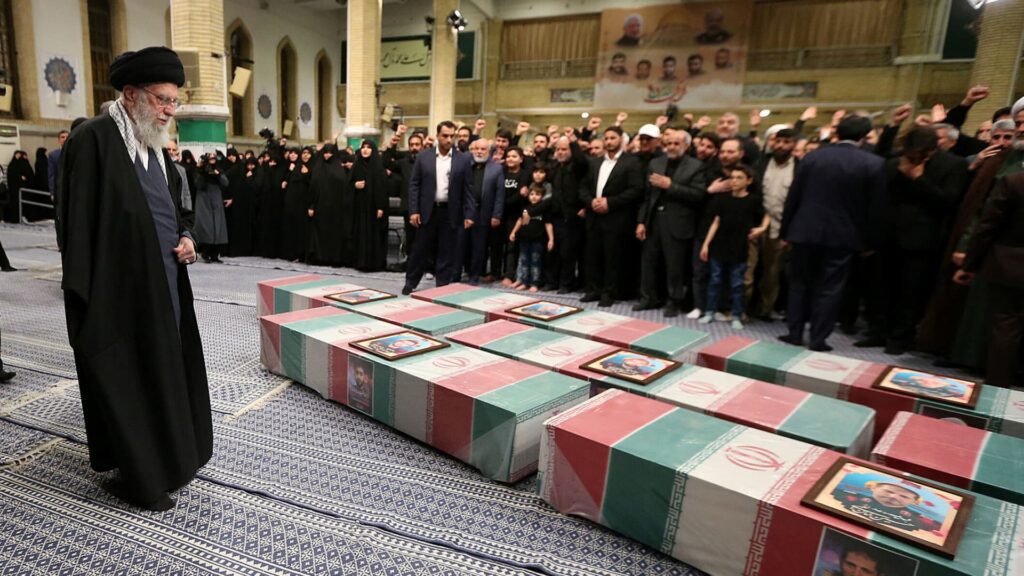Iran's Supreme Leader, Ayatollah Ali Khamenei, looks at the coffins of members of the Islamic Revolutionary Guard Corps killed in the Israeli airstrike on the Iranian embassy compound in the Syrian capital, Damascus, during a funeral ceremony in Tehran, Iran, April 4, 2024. Office of the Iranian Supreme Leader
Wana News Agency | Via Reuters
Iran on Saturday launched attacks against Israel, according to US officials, escalating long-standing tensions between the two countries that have the potential to ignite a regional war.
“Iran has begun an air attack against Israel,” National Security Council spokeswoman Adrienne Watson said in a statement on Saturday. He added, “The United States will stand with the people of Israel and support their defense against these threats from Iran.”
Israeli military spokesman Daniel Hagari said on Saturday that Israel would work in “close coordination” with the United States and regional partners to intercept the launches.
He added: “We are monitoring the threat in the airspace. It is a threat that takes several hours to reach the territory of the State of Israel.”
US officials told NBC News that the Biden administration expects the Iranian attack to target Israeli government sites, not civilian or religious sites and not US assets in the region.
One official added that the administration expects the attack to include 100 drones, dozens of cruise missiles, and dozens of ballistic missiles.
Before Saturday's attacks, President Joe Biden was on his way back to the White House, earlier than initially scheduled, to meet with his national security team, including Defense Secretary Lloyd Austin and Secretary of State Antony Blinken, amid the growing possibility of an attack. Iranian strike.
Earlier on Saturday, the Iranian Revolutionary Guard seized a Portuguese-flagged cargo ship with ties to Israel in the Strait of Hormuz, a major shipping route. The White House condemned the move shortly after.
In anticipation of the attacks, airspace in Israel and throughout the region was temporarily closed.
Israel also announced that it will close schools starting Sunday and limit gatherings to 1,000 people in certain areas.
Tensions between Iran and Israel have escalated since the beginning of the war on Gaza in October, especially during the past few weeks after Iran accused Israel of carrying out an attack on its consulate in Damascus on April 1.
The Islamic Revolutionary Guard Corps said in a statement on Saturday that the launching of missiles and drones came “in response to the crimes of the Zionist regime.”
Iranian leaders, including Ayatollah Ali Khamenei, had previously vowed to retaliate against Israel over the strike in Damascus, and Israel in turn threatened to launch a counterattack of its own. Israel neither confirmed nor denied its involvement in the Damascus attack.
“If you attack Iran from its territory, Israel will respond and attack in Iran,” Israeli Foreign Minister Yisrael Katz wrote in a Wednesday post on X, tagging Ayatollah X’s account.
Given the various Iranian warnings, the White House was anticipating an Iranian strike and was communicating with Israel to ensure it was prepared to defend itself.
